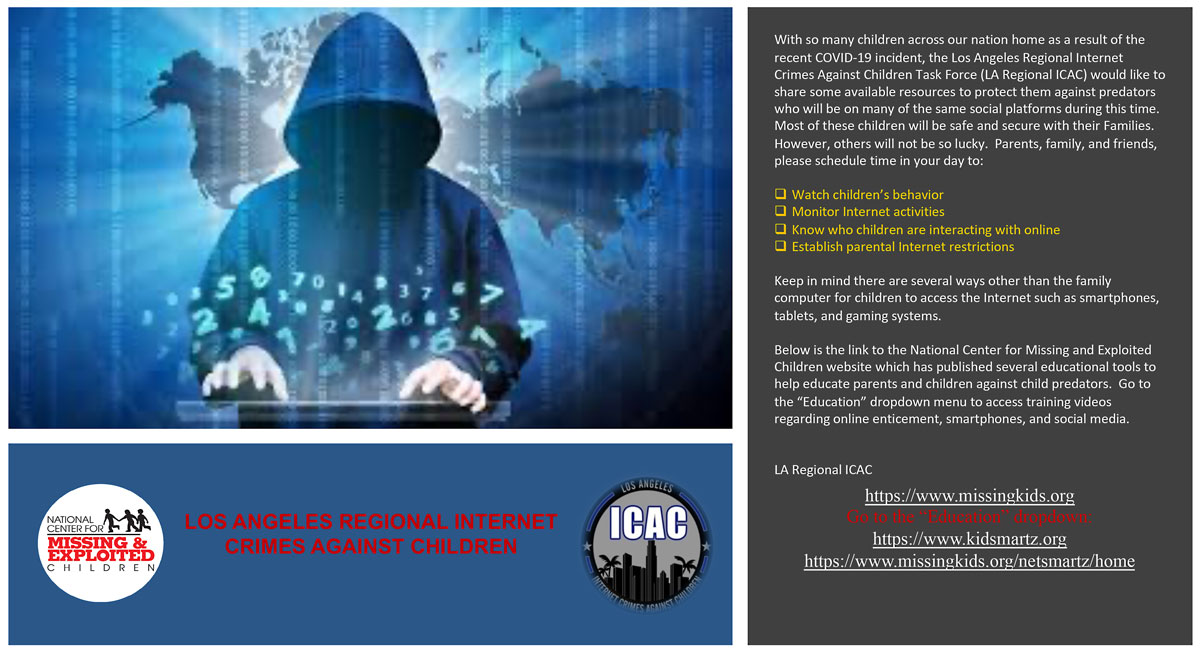Internet Safety for CHILDREN
Since the beginning of March 2020, child exploitation CyberTips reported to the National Center for Missing and Exploited Children (NCMEC) have increased nationwide. NCMEC reports they have experienced a 106% increase in CyberTipline reports, from 983,734 reports in March 2019 to 2,027,520 in March 2020.
Although this significant increase can be attributed in part to a few viral videos being shared and reported in March, this does bring up an opportunity to talk to your children about internet safety, and proper reporting of these crimes if seen.
As part of Los Angeles Regional Internet Crimes Against Children Task Force, the Los Angeles County Sheriff’s Department receives CyberTips from NCMEC and investigates them, along with the Los Angeles Police Department and our multiple local and federal law enforcement partners. If you are on the internet and see a child being exploited online, please don’t share the video out of outrage, report it to your local law enforcement agency, or NCMEC by visiting https://report.cybertip.org/.
With recent school closures due to #COVID19, many children are using the internet from home and have recently created email accounts or social media profiles to communicate with their friends or to complete school work and education programs. If not properly supervised, this leaves children vulnerable to social engineering scams, and potentially being conned into revealing sensitive information about themselves and family, or even sharing compromising photographs of themselves.
We at the LASD are encouraging parents of children of any age to discuss internet safety with your child. Any time is the right time to make sure your children are safe. Below are some recommended tips you can follow to protect your child from becoming a victim.
-TALK about Internet safety with children of ALL ages before they engage in online activity. Keep in mind there are several ways other than the family computer for children to access the internet, such as smartphones, tablets, and gaming systems.
-Review & approve games and apps before they are downloaded… especially applications that require access to your photos, videos, voice, and have messaging capabilities.
-Make sure privacy settings are set to the strictest level possible for online gaming systems and electronic devices. You can use parental controls or manually scan your child’s device as needed.
-Monitor your children’s use of the internet; keep electronic devices in an open, common room of the house. Contact your Internet Service Provider to learn how to enable parental controls or use downloadable software or apps.
-Check your children’s social media profiles and see what personal information they are sharing publicly. Make sure they are not posting their age, address, phone numbers, or any other personal information.
-Explain to your children that images AKA selfies posted online will remain permanently on the internet and never share an image they don’t want the whole world to see.
-Make sure children know that anyone who asks a child to engage in sexually explicit activity online should be reported to a parent, guardian, or other trusted adult and law enforcement.
-Remember that victims should not be afraid to tell law enforcement if they are being sexually exploited. It is not a crime for a child to send sexually explicit images to someone if they are compelled or coerced to do so.
For additional information, visit the links listed below to the National Center for Missing and Exploited Children website, which has published several educational tools to help educate parents and children against child predators. Go to the “Education” drop-down menu to access training videos regarding online enticement, smartphones, and social media.
CyberTips can be reported to NCMEC at: https://report.cybertip.org/
Educational Materials are available at:


